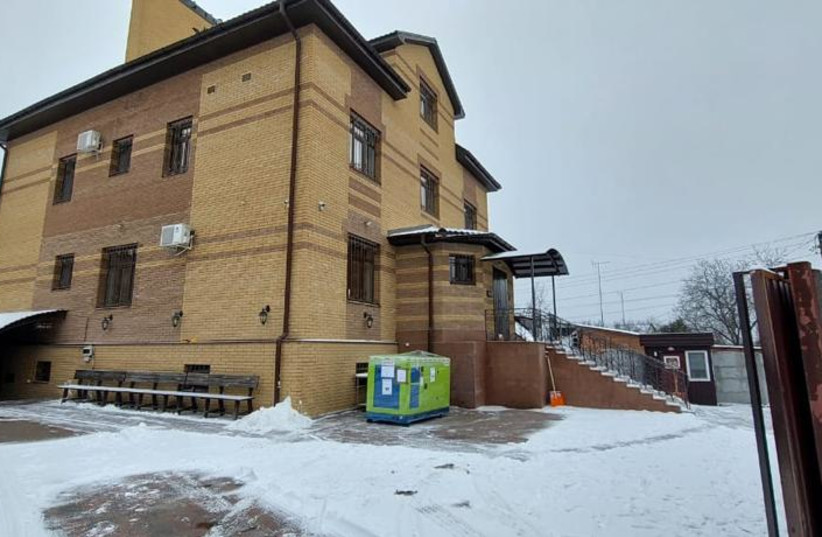As the Russian war in Ukraine nears its year-long anniversary, millions of Ukrainians have been left with no electricity or heat due to blackouts. The Ukrainian Jewish community has been generously gifted with 150 electric generators for schools, community centers and synagogues. This is what has helped thousands of elderly Jews in Ukraine survive the severe cold.
The heavy frost and the incessant power outages, in the midst of the tumultuous war, have led to a state of emergency. The northern city of Chernihiv, for example, reached -7°C on Monday morning with snow covering the whole area.
As the temperatures dropped the generators were sent to Jewish communities across Ukraine. An employee in the Jewish Relief Network Union (JRNU) said “the generators were sent from different countries around the world, through many border crossings and reached the Jewish communities just in time.”
The source, who physically helped to distribute the generators, explained that “they were installed with the assistance of huge cranes in the courtyards of many synagogues and Jewish community centers.”
Rabbi Shlomo (Shlomi) Chaim Peles, who heads the JNRU rescue center, said, “Throughout this operation, we faced a very big challenge. There is a huge demand in Ukraine for generators, whether by the army, hospitals or other national institutions.”

This operation wouldn’t have happened if it wasn’t for the funding of the Jewish Federations of North America (JFNA) and the Orthodox Union (OU), he explained.
Peles said that many individuals and groups “raided the factories which produce generators in Ukraine and around the world.” This caused a major shortage of generators.
“With the help of Chabad’s connections in the world, we were able to reach the big factories and get special production for generators for the Jewish communities as well,” Peles said.
This operation wouldn’t have happened if it wasn’t for the funding of the Jewish Federations of North America (JFNA) and the Orthodox Union (OU), he explained.
“The winter forecast in Ukraine is extremely concerning, with the potential for an even graver humanitarian crisis, and our latest allocation reflects our attention to the evolving needs on the ground and our ongoing commitment to providing relief where it is most needed,” JFNA’s president and CEO, Eric Fingerhut, said in a statement.
Heating isn't the only thing that Ukrainians are missing
Unfortunately, electricity isn’t the only obstacle that Ukrainian Jews face. Ukrainians in general are also facing a lack of fresh water that is clean enough for drinking. Peles said that “after many long meetings we conducted, we came to the conclusion that the only solution at the moment is to dig wells that will offer clean water for the children, the elderly and in fact, to all Ukrainian Jews.”
“We provided the generators to all Jewish communities in Ukraine, regardless of their background,” Peles said. “Using a huge warehouse in Kyiv, we have stored and later transported large quantities of food and medicine to the Jewish communities, on an ongoing basis, with the aim that there will not be one hungry Jew in Ukraine.
Unfortunately, there are Holocaust survivors living without any heat. A head of a Jewish old-age home told the Post that “these patients have already been through the worst human situations possible, and now, during the last years of their lives, are lying in bed in a serious state of health and need medication, in addition to the fact that there is no heat.”
The manager of the Jewish care home in a Ukrainian city said that “the caretakers couldn’t shower these Holocaust survivors for two days since there was no warm water and they have been serving them cold food.”
“I imagine that they dipped their bread in water that they would swear by because we couldn’t even make hot porridge today,” he said sadly. “I pray for better days, that we will be able to help the elderly and the other thousands of Jews who remain in our city.”
“The generator operation,” as Peles calls this complex project, is currently at its peak. Every week, new generators are delivered to more Jewish communities in Ukraine. Peles concluded that “at the beginning of the war, we were concentrating on rescuing Jews, but nowadays, all of our rabbis are focusing all of their efforts on the survival and preservation of the lives of Jews. There is no doubt that these generators have an important and decisive influence on the survival of the community members and their Jewishness.”
“The food is distributed to the homes of the Jews who need this assistance, in order for them to be able to survive this difficult period in history."
Rabbi Shlomo Chaim Peles
These generators have also been installed in Jewish schools across Ukraine. “Many of our Jewish schools are currently powered by the generators,” a Ukrainian Chabad rabbi said.
“Without the generators, our educational institutions would be desolate. The frost is terrible and no parent would send their children to school.”
Peles added that the generators “enable daily cooking of hot food and quick delivery to the homes of the elderly and Holocaust survivors, who are scattered throughout the Jewish communities in Ukraine.”
